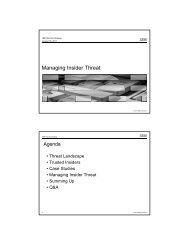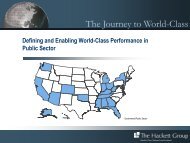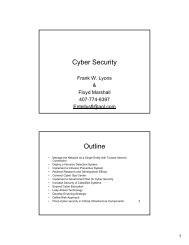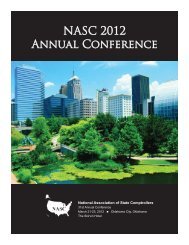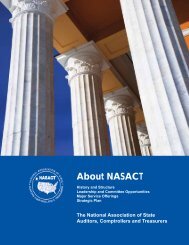Advisory Committee on Tax Exempt and Government Entities (ACT ...
Advisory Committee on Tax Exempt and Government Entities (ACT ...
Advisory Committee on Tax Exempt and Government Entities (ACT ...
You also want an ePaper? Increase the reach of your titles
YUMPU automatically turns print PDFs into web optimized ePapers that Google loves.
The Appropriate Role Of The Internal Revenue Service With Respect To <strong>Tax</strong>-<strong>Exempt</strong> Organizati<strong>on</strong> Good Governance IssuesInternet has facilitated this interstate <strong>and</strong> internati<strong>on</strong>al expansi<strong>on</strong>, not <strong>on</strong>ly in thesolicitati<strong>on</strong> of funds, but also in the operati<strong>on</strong> of programs. The fact that an organizati<strong>on</strong>that is active in a state with developed expectati<strong>on</strong>s about n<strong>on</strong>profit governancepractices need <strong>on</strong>ly adhere to the potentially more relaxed rules of its state ofincorporati<strong>on</strong>—even if it has no physical presence in the latter jurisdicti<strong>on</strong>—becomesincreasingly hard to accept from interstate n<strong>on</strong>profit operators. 54It is perhaps unsurprising then that in our discussi<strong>on</strong>s with state charities regulators wefound them generally receptive to the exp<strong>and</strong>ing role of the IRS in matters of n<strong>on</strong>profitgovernance, at least with respect to additi<strong>on</strong>al Form 990 governance disclosures, anexp<strong>and</strong>ed educati<strong>on</strong>al role for the IRS, <strong>and</strong>, most importantly, the IRS sharing data withthe states. 55 States requiring reporting by charities often accept the federal Form 990for their purposes, 56 <strong>and</strong> the new form’s exp<strong>and</strong>ed inquiries into governance providesadditi<strong>on</strong>al tools for state charities regulators to identify organizati<strong>on</strong>s that are lackingsome of the governance indicators that are believed associated with the protecti<strong>on</strong> ofcharitable assets. 57 In the absence of adequate enforcement resources at the statelevel, the IRS can play an important educati<strong>on</strong>al role that promotes self-correcti<strong>on</strong>. Insum, our interviews indicate that the recent expansi<strong>on</strong> of federal interest in n<strong>on</strong>profitgovernance is viewed by the states as a complement <strong>and</strong> supplement to state efforts,rather than as a threat to their authority. 58However, state regulators’ receptivity to an exp<strong>and</strong>ed federal role in matters of n<strong>on</strong>profitgovernance is not without qualificati<strong>on</strong>. C<strong>on</strong>cerns include the federalizati<strong>on</strong> ofgovernance issues <strong>and</strong> impinging <strong>on</strong> the enforcement discreti<strong>on</strong> of the states. Onestate regulator from a state active in charity regulati<strong>on</strong> speaking to the “duplicative” state54For example, Delaware, a popular state of incorporati<strong>on</strong> for organizati<strong>on</strong>s even with no programmatic presence in that state,permits corporati<strong>on</strong>s to be formed with <strong>on</strong>ly a single director. Delaware General Corporati<strong>on</strong> Law § 141(b). But see AmericanCenter for Educati<strong>on</strong>, Inc. v. Cavnar, 80 Cal. App. 3d 476, 478 (Cal. 1978)(“[W]e believe that acti<strong>on</strong>s taken in California c<strong>on</strong>cerningthe administrati<strong>on</strong> of that charity should not escape the scrutiny of California law, merely because the founders chose to incorporateelsewhere.”).55We also note that the IRS plays a collaborative role with the states in c<strong>on</strong>necti<strong>on</strong> with sharing certain informati<strong>on</strong> about charities.Prior to C<strong>on</strong>gress adopting the Pensi<strong>on</strong> Protecti<strong>on</strong> Act of 2006, P.L. 109-280, federal tax law imposed strict limits <strong>on</strong> the informati<strong>on</strong>the IRS could disclose to state law enforcement officials about c<strong>on</strong>cerns involving secti<strong>on</strong> 501(c)(3) organizati<strong>on</strong>s. Under new IRCsecti<strong>on</strong> 6103(p)(4), the state official charged with regulating charities may request in writing (<strong>on</strong> Form 8821), <strong>and</strong> the IRS must thendisclose, a notice of proposed revocati<strong>on</strong> of exempt status, or proposed refusal to recognize exempti<strong>on</strong>; a notice of proposedeficiency of tax under secti<strong>on</strong> 507 or the private foundati<strong>on</strong> provisi<strong>on</strong>s in chapter 42; the names, addresses <strong>and</strong> taxpayeridentificati<strong>on</strong> numbers of organizati<strong>on</strong>s that have applied for exempti<strong>on</strong>; <strong>and</strong> return informati<strong>on</strong> pertinent to any of the above. Similardisclosures are now permitted for any 501(c) organizati<strong>on</strong> but <strong>on</strong>ly for the purpose of, <strong>and</strong> to the extent necessary in, theadministrati<strong>on</strong> of state laws regarding charitable assets. See IRC secti<strong>on</strong>s 6103, 6104, 7213, 7213A <strong>and</strong> 7413.56According to the Nati<strong>on</strong>al Associati<strong>on</strong> of State Charities Officials, state regulators have been accepting the Form 990 as a statefiling instrument, at least in part, since 1981. See Nati<strong>on</strong>al Associati<strong>on</strong> of State Charity Officials Comments <strong>on</strong> proposed Changesto Form 990, September 14, 2007, http://www.nasc<strong>on</strong>et.org/NASCO_Comments_IRS_Form_990.pdf.57One representative from a state attorney general’s office, interviewed al<strong>on</strong>g with others from the Nati<strong>on</strong>al Associati<strong>on</strong> of StateCharities Officials, described the new governance questi<strong>on</strong>s as “great” because not all states have the capacity to m<strong>on</strong>itor n<strong>on</strong>profits<strong>and</strong>, if the IRS does not ask governance questi<strong>on</strong>s of these organizati<strong>on</strong>s, no <strong>on</strong>e will.” (Teleph<strong>on</strong>e interview with state charitiesregulators, Nati<strong>on</strong>al Associati<strong>on</strong> of State Charity Officials, November 5, 2007).58James Tierney, the former Attorney General of Maine, dismissed the prospect of c<strong>on</strong>fusi<strong>on</strong> caused by differences in state <strong>and</strong>federal approaches to n<strong>on</strong>profit governance as something that the various states must c<strong>on</strong>fr<strong>on</strong>t every day, observing “We’re notFrance.” . (Teleph<strong>on</strong>e interview with James Tierney, David E. Ormstedt, Tam Ormist<strong>on</strong>, <strong>and</strong> Cindy Lott, Nati<strong>on</strong>al State AttorneysGeneral Project, Columbia University Law School, October 29, 2007).ADVISORY COMMITTEE ON TAX EXEMPT AND GOVERNMENT ENTITIES (<strong>ACT</strong>) June 11, 2008 20






